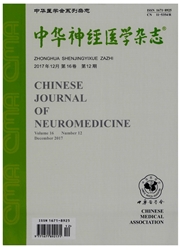

 中文摘要:
中文摘要:
目的探讨清醒状态下丘脑底核(STN)长期在体多通道单细胞放电记录新技术。方法采用自行设计的集束式微电极阵列记录STN单细胞放电情况。设计主要由3部分构成:(1)29号皮下注射用不锈钢管为引导管固定电极丝,并作为脑组织接地电极;(2)5根20μm铂铱合金丝作为记录电极,1根50.8μm不锈钢合金丝作为局部参考电极,电极尖端呈“路标手”样排列,聚乙二醇固定;(3)带有螺丝旋紧的连接器减少实验动物自由活动带来的信号伪迹。将这种电极用于6只正常清醒大鼠STN单细胞放电记录,评价术后5周内的STN单细胞放电单位的记录稳定性。结果术中记录到27个STN放电单位,70.4%(19/27)存活超过2d:5周内记录到9个新生放电单位。术后峰峰波幅与时间之间无显著线性相关性(r=-0.047,P=0.655);并且信噪比维持稳定,其与峰峰波幅间存在显著线性相关(r=0.934,P=0.000)。电极植入3周,仍有超过50%的细胞保留率。相同神经元75%波形相似系数大于0.90。结论本研究设计的微电极阵列在记录活动状态下STN单细胞放电时.波形特征稳定.细胞保留率理想,适用于慢性清醒状态在体STN多通道单细胞放电的电生理记录.
 英文摘要:
英文摘要:
Objective To introduce a bundled microelectrode array of chronic in vivo single-unit recording in subthalamic nucleus (STN) of freely behaving rats. Methods STN single cell discharge was recorded by a self-designed bundled microelectrode array. Our microelectrode array design consisted of 3 parts: (1) a 29-guage stainless steel tube was served as a guide tube to facilitate the brain penetration ofmicrowire tips, and as a ground electrode of the brain tissues as well. (2) Five 20μm platiniridium wires were used as recording electrodes and a 50.8 μm stainless steel wire with 1 mm bare tip was employed as local potential reference; all the above resembled a guiding-hand-shaped arrangement in microwire tips, and was fixed by tiny plot of carbowax moreover. (3) A male connector with end screw receptors was employed to make the array connection more stable so as to minimize the movement artifacts; six normal rats were implanted with this kind of electrode arrays, and the stability of STN single-unit recording was evaluated in the following 5 weeks. Results Twenty-seven firing units were captured during operation, of which 70.4% (19/27) survived more than 2 d, and 9 new units were acquired within 5 weeks. No significant linear correlation of peak-to-peak amplitude was noted between each 2 different recording sections (Pearson r=-0.047, P=-0.655), and whilst signal-to-noise ratio was stable with significant correlation to peak-to-peak amplitude (r=0.934, P=0.000). More than half of the initial acquired STN units retained more than 3 weeks. And there were more than 75% r values of waveform similarities large than 0.90 of the same units across different periods. Conclusion This methodology may be appreciated for STN long-term single-unit recording with stable recording quality and favorable cell retained rate.
 同期刊论文项目
同期刊论文项目
 同项目期刊论文
同项目期刊论文
 Targeted Cryosurgery for the Treatment of Cerebral Glioma with Cryocare Surgical System Guided by St
Targeted Cryosurgery for the Treatment of Cerebral Glioma with Cryocare Surgical System Guided by St Cryo-ablation improves anti-tumor immunity through recovering tumor educated dendritic cells in tumo
Cryo-ablation improves anti-tumor immunity through recovering tumor educated dendritic cells in tumo In-situ administration of dendritic cells following argon-helium cryosurgery enhances specific antig
In-situ administration of dendritic cells following argon-helium cryosurgery enhances specific antig In-situ administration of dendritic cells following argon–helium cryosurgery enhances specific antig
In-situ administration of dendritic cells following argon–helium cryosurgery enhances specific antig Extracts from glioma tissues following cryoablation have proapoptosis, antiproliferation, and anti-i
Extracts from glioma tissues following cryoablation have proapoptosis, antiproliferation, and anti-i 期刊信息
期刊信息
